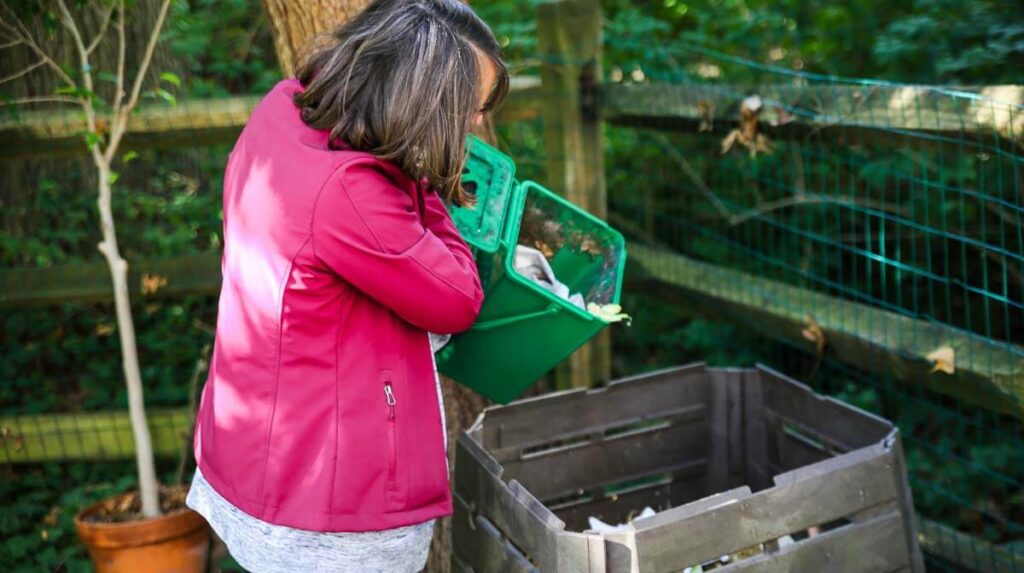Composting is nothing new. It relies on the cycle of life, whereby microscopic organisms decompose nature’s leftovers into a dark, crumbly product called compost. This final product has many uses on your lawn — it improves soil structure, retains moisture and fertilizes plants.
By diverting food waste from the landfill, you are also lowering your carbon footprint.
Find the right approach for you.
Keeping food out of the landfill is easier than ever in Princeton.
Here are three options to compost or recycle your food scraps:
A curbside “micro-hauling” service is a great option for those who live in an apartment, don’t have a yard or the ability to manage food waste themselves.
- Join the free Princeton municipal food scrap drop off program: residents of the municipality can sign up for the free food scrap drop off program here.
- Residential curbside: these haulers will pickup your food scraps from your home: One Compost Can and Un-Waste.
- Lower-income households can receive FREE curbside pickup from Torus
- Commercial curbside: options in Princeton include: Green Bucket Compost, and Organic Diversion
Sustainable Princeton does not endorse or recommend these companies and are providing them solely for informational purposes.
- Do your homework. Contact these vendors directly to learn what organic materials they collect and recycle, where and how materials are recycled, and their fees and terms.
- Follow the rules. Composting is a delicate process, so be sure you understand what materials are accepted by your specific vendor.
Backyard composting -- establish a pile or bin
- Mix it right. Add equal weights of green and brown materials to your pile. Green materials include grass clippings, fruit and vegetable scraps, and coffee grounds. Brown materials consist of dead leaves, wood chips, or chopped straw.
- Keep it moist. Water your pile to maintain an even moisture throughout.
- Air it out. Rotate your bin or use a pitchfork to turn your pile so your compost can breathe.
- Consider the options. Make a bin from old wood pallets or buy a ready-made tumbler. Large piles compost faster than smaller ones, but also need to be turned more often.
- Know the details. For more information, review the Rutgers Home Composting webpage. Visit the Mercer County Home Compost Demonstration Site to learn more.

Vermicomposting – composting with red worms
- Contain your worms. Repurpose an old plastic bin or 5-gallon bucket.
- Keep them cozy. Use shredded newspaper, cardboard, or dead leaves for bedding.
- Water appropriately. When edges of the bedding begin to dry, add water.
- Control their diet. Red worms will eat fruit and vegetable scraps, coffee grounds, and a few other items — about 3 lbs per week.
- Watch the temp.Worms need to avoid extreme temperatures — keep them indoors during winter.
- Get more info. Review the Rutgers Vermicomposting publication.
Bokashi – a fermentation process
- Mix it up. Food scraps — all scraps are acceptable — are mixed with bokashi bran.
- Let it chill. Once your bucket is full, cover it and set it aside for 1-2 weeks.
- Drain liquids. Fermentation “tea” can be used to feed plants.
- Add it to your compost. Once the fermentation process ends, remove the digested waste and allow it to compost.
- Learn more. Review the Bernalillo County Extension Master Composters Bokashi Composting Resource.
Backyard chickens – compost plus fresh eggs
- Keep them safe. Foxes, hawks, and other predators are lurking, so ensure your coop offers protection.
- Daily chores. Provide fresh water and food for your hens each day. Be sure to collect their eggs.
- Dump your scraps. Chickens are omnivores and will devour your foodwaste.
- Compost their waste. Your hens’ manure, bedding (eg, leaves or straw), and uneaten food scraps are all compostable.
- Know the rules. Princeton residents should follow this Backyard Chicken Ordinance. If you are outside of Princeton, check with your local officials.
Did you know?
- Don’t bite off more than you can chew. Food waste is the single largest component in our waste stream, accounting for one-fourth of what we send to the landfill.
- Pass the gas. When food scraps break down in the landfill, they generate methane gas, a key contributor to climate change.
- A lost opportunity. Within the US, 14% of our emissions are from landfill methane gas. When properly captured and converted, methane can be used as a renewable energy source.




